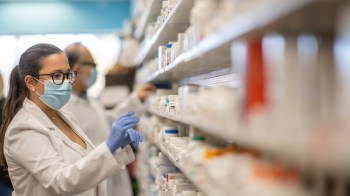Looking for a cure to high drug prices
Share Now on:
Looking for a cure to high drug prices
KAI RYSSDAL: No matter the state of the economy, complaints about high drug costs are nothing new. But one doctor in London says he’s come up with a way to cut prices for new medicines. Helen Palmer reports from the Marketplace Health Desk at WGBH.
HELEN PALMER: Dr Sunil Shaunak is an infectious disease specialist at London’s Hammersmith Hospital. He’s developed a novel form of the therapy, Interferon, used to fight Hepatitis C.
DR. SUNIL SHAUNAK: For biopharmaceuticals, we think this is an opportunity waiting to be used in other contexts.
Interferon’s still on patent for the next decade. The therapy currently costs around $15,000 in the U.S., and the most effective drugs are far too expensive for developing countries. So Shaunak’s partnered with a generic drug company in India, to do clinical trials and produce the drug at near cost.
SHAUNAK: If you’re doing this in the context of a big pharmaceutical, then actually profit is a very important agenda because that’s a commercial venture.
But his research was funded by medical charities. Still, this doesn’t necessarily mean a new era of very cheap drugs. Ken Kaitin of the Tufts Center for the Study of Drug Development:
KEN KAITIN: The overall cost to just go through clinical testing of these products based on some studies that we’ve just done is over $600 million.
Kaitin says there could be savings if all the trials and development happen in a low-cost country like India. More important, Kaitin says this is part of a wider trend of rethinking drug development for poor countries, spurred by the Bill and Melinda Gates Foundation. Nevertheless, Dr Shaunak says he’s getting great interest from his employer, Britain’s National Health Service.
SHAUNAK: Having made a medicine that was cost-effective and affordable for the developing world, the National Health Service is over the moon about it.
The NHS hopes to save millions of pounds from its strapped drug budget. If the drug works, the same could be true in the U.S.
In Boston, I’m Helen Palmer for Marketplace.
There’s a lot happening in the world. Through it all, Marketplace is here for you.
You rely on Marketplace to break down the world’s events and tell you how it affects you in a fact-based, approachable way. We rely on your financial support to keep making that possible.
Your donation today powers the independent journalism that you rely on. For just $5/month, you can help sustain Marketplace so we can keep reporting on the things that matter to you.


















